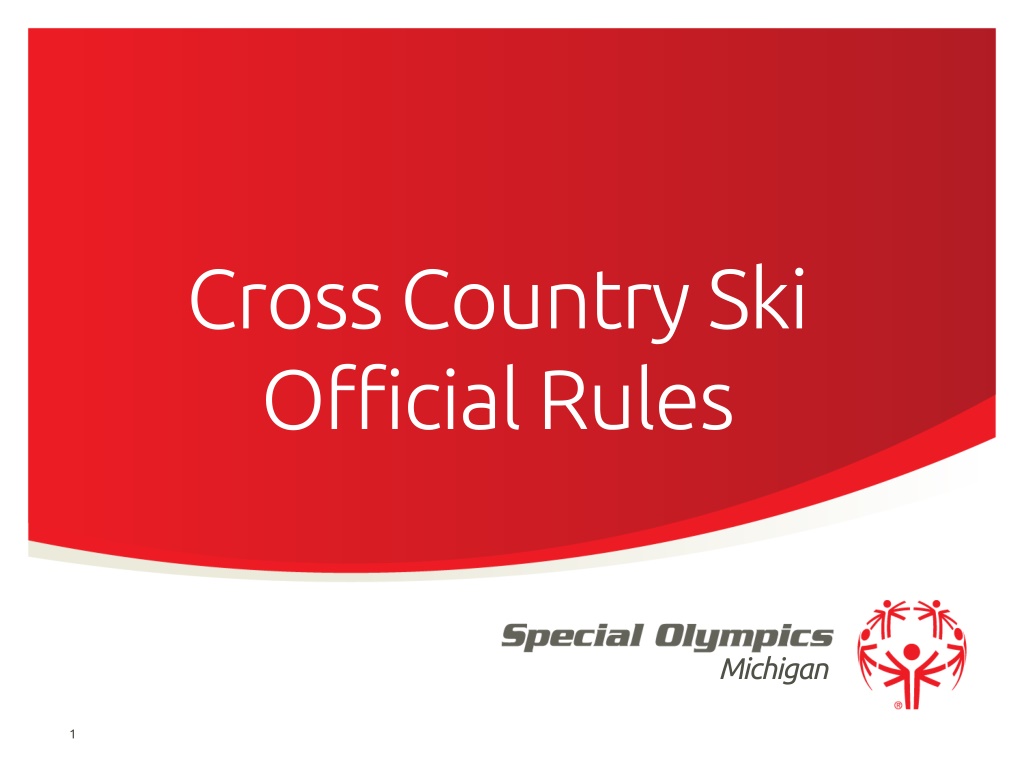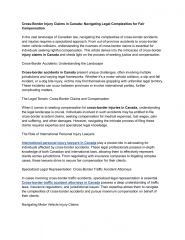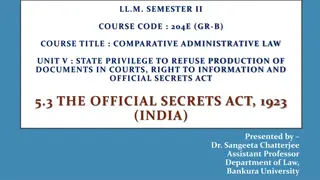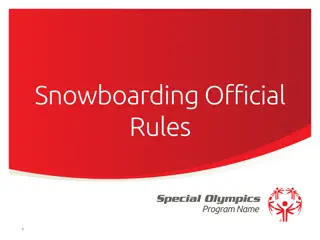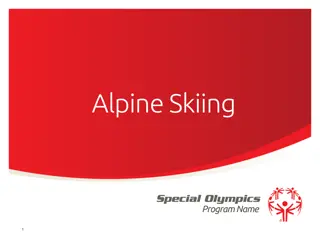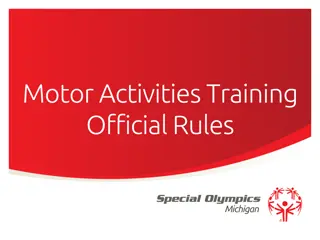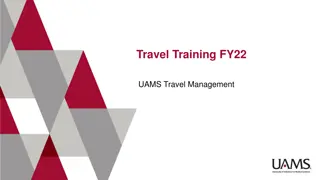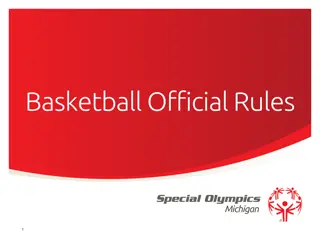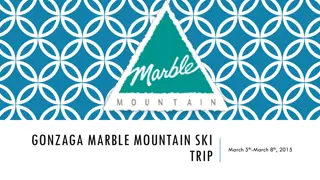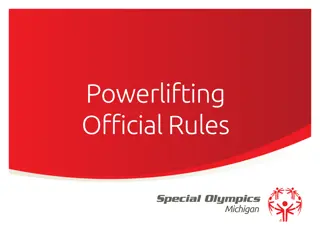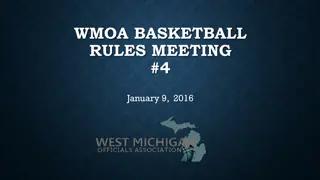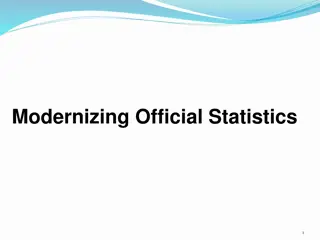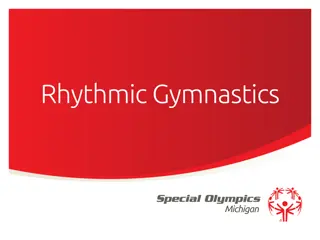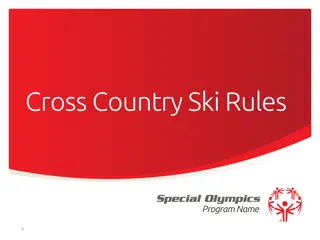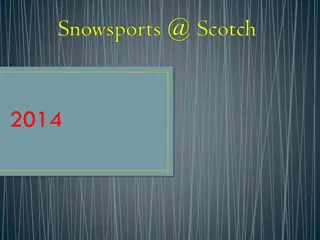Official Rules and Guidelines for Cross-Country Skiing in Michigan
Explore the official rules, guidelines, and equipment requirements for cross-country skiing in Michigan. From event offerings to uniform guidelines and general rules, this comprehensive overview provides essential information for athletes participating in cross-country skiing competitions.
Download Presentation

Please find below an Image/Link to download the presentation.
The content on the website is provided AS IS for your information and personal use only. It may not be sold, licensed, or shared on other websites without obtaining consent from the author. Download presentation by click this link. If you encounter any issues during the download, it is possible that the publisher has removed the file from their server.
E N D
Presentation Transcript
Cross Country Ski Official Rules Michigan 1
A picture paints a thousand words A picture paints a thousand words Let me win, but if I cannot win, let me be brave in the attempt. Use the Picture and Caption format to create strong compelling slide like this. Don t t forget to caption where possible. For best effect crop the image to fill the placeholder. 2
The Basics Sport season: December-February Culminating State Event: State Winter Games
Events Offered Events Offered 50 Meter 100 Meter 250 Meter 500 Meter 1K 2.5K 5K 4x1K Relay 4x1K Unified Relay (local)
Uniform Guidelines and Equipment Athletes should wear appropriate winter sports attire. Warm ski gloves or mittens, a hat, scarf, headband or ski mask, and sun-glasses or goggles are recommended. It is best to wear clothing that is layered to trap heat between layers. Layered clothing is especially important for 500 meter, 1K, and 2.5K skiers. 5
Uniform Guidelines and Equipment Bibs: All competitors must wear competition bibs for both time trials and finals races. Competition bibs include the athlete s entry number Competition equipment, such as skis, boots, bindings, and poles, must pass all appropriate safety guidelines. Jewelry and denim may not be worn during competition or practice. Headwear for religious or medical reasons are acceptable but must be brought to the attention of the Games Director prior to competition.
General Rules Athletes may enter three (3) events if one is the 5K. Events ranging from the 500 Meter race to the 5 K race should follow the interval start format. That is, one or two racers should start at intervals of every 30 seconds.
General Rules The start command for cross-country skiing events ranging from the 500 Meter race through the 2.5 Kilometer race shall be as follows: "Racer... 15 seconds... 10 seconds... 5, 4, 3, 2, 1, GO!" For individual events of distances 100 meters or less, there shall be no preliminary warning. The start command for relay events shall be the same as for individual events of distances 100 meters and less, except that there will be a 10 second warning: "10 seconds... racers... ready... Bang."
General Rules Due to the possibility of very low registration numbers, the following events may be combined and run as open divisions: 2.5K & 5K, this means combining males and females and all age groups. Athletes will be awarded separately.
Course Layout/Facilities Markers, poles, and fencing shall be available to identify the course. Poles and fencing shall be used to block off trails, which might lead the competitors off the race course. Banners shall mark the start and finish.
Course Layout/Facilities Electric timing with a backup, handheld timing system shall be used for timing 1- 10 kilometers events. The 100-meter event should be timed with a number of stop watches equal at least to the number of athletes per division, plus two. A watch should be assigned to each lane while two extras serve as backup.
Course Layout/Facilities Cross-country trails, suitable in length and terrain to accommodate skiers of beginning, intermediate, and advanced skill levels shall be available. At least one set of tracks should be set and the other lane, which is mandatory, shall be set as either a skating lane or second set of tracks.
Course Layout/Facilities If more than one set of tracks are used, they should be 1 to 1.2 meters apart, measured from the middle of one track to the middle of the other. Individual ski tracks should be 20 - 24 centimeters apart, measured from the middle of one track to the other. Tracks should be at least 2-5 centimeters deep. A warming facility should be accessible from the trails. It should be large enough to accommodate the Special Olympics crowd in case of extreme weather conditions.
50-, 100- & 250-Meter Races The start line is a straight line. There must be 8 lanes with tracks set in the center of each lane. These lanes must be a minimum of 2 meters wide. The course for the 100 Meter and 250 Meter events should be as flat as possible. In no event should a course slope more than 5%. In the event that the course is set on slopes, the start of the race shall be such that the competitors will ski uphill to finish the race.
500-Meter, 1-, 2.5- & 5K Races Events ranging from the 500 Meter race through the 5 Kilometer race should be conducted on courses which include uphill, downhill, flat sections, and sections with turns. They should be conducted on courses, which are a loop configuration. In long distance events, multiple loop courses are permissible.
Relays 4 x 1K Relay is each athlete competing in a 1K length. Divisions for cross-country skiing relay races shall be established by computing Team Qualifying Times. A Team Qualifying Time is computed by combining the times of the members of a team in time preliminaries from the individual event of similar distance to one "leg" of the relay event (e.g. Times from the 1 Kilometer Cross-Country Skiing Relay).
Relays Team members not entered in the individual event of similar distance to one "leg" of the relay event must enter and compete the preliminary event for that individual event. Race officials may start a relay division once every minute. In the event a team does not execute a proper exchange, an exchange zone referee shall notify the skiers involved in the exchange immediately. It is then the skier s responsibility to decide whether or not to re-execute an exchange.
Relays Teams who do not execute a proper exchange will be disqualified. In Unified Relay Races, Athletes and Unified Partners may race in any order.
Disqualification A competitor may be disqualified if he/she: Does not follow the marked course or does not pass all the control check points or takes a short cut. Receives unauthorized assistance. Fails to give way to an overtaking competitor when so requested or prevents another racer from passing. Violates technique ruling regarding skating in classical races.
A competitor may be disqualified if he/she: Does not finish with skis on his/her feet. Falls or leaves the track: that individual has 2 minutes to resume racing, the competitor must also advance forward a minimum of 20 meters within that time. Failing to resume advancement on the track within 2 minutes, and/or receiving unauthorized assistance. Does not execute a proper exchange during a relay race results in the entire team being disqualified.
